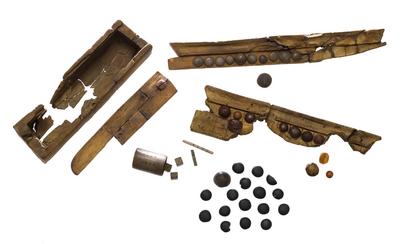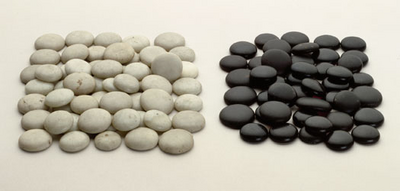Fun and games
The discovery of game boards, pieces and dice tells us something about the soldiers leisure and everyday life. One of Vimose game boards are divided into quadrants, on the one side, and are half curved on the other side. On the half curves you could play a game a bit like backgammon. The other side of the board may have been used for the Roman military strategic game Ludus latrunculorum (Ludus = game latro = stone (piece), tatrunculus = soldier). The game is described in written sources, so you can play it today. They used round, flat pieces of amber, bone or glass. The white, blue and black glass pieces came from the Roman provinces. The pieces of amber and bones were probably made locally, perhaps by the individual soldier. Dice is also found in Vimose, but unlike today's cubes, the eyes on the opposite sides does not make 7 - they are always different.
Play the Roman soldiers game Ludus latrunculorum
You will need: a game board with 8x12 fields, 34 small pieces in two colors and two larger pieces as "kings". Each player has 17 pieces, placed two at a time in shifts around the board. When all the pieces are in place, set "kings". The pieces can be moved one square at a time: forward, backward, sideways, but not diagonally; king moves as the other pieces, but can also jump over an enemy piece. To catch opponents pieces by standing on each side of the piece on a line (you can also catch the pieces in the corners, but not the sides). The beated pieces is removed from the board. The game is won by capturing the opponent's king (surrounded on all four sides) or by taking all the opponents pieces.

Read more about the royal family at Stevns.

